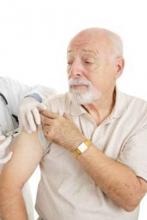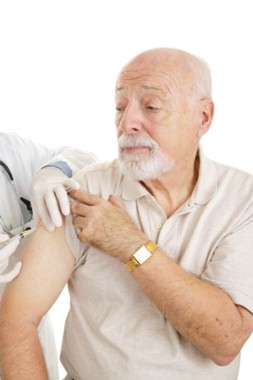User login
The tetanus-diphtheria-acellular pertussis vaccine was as safe in seniors as the tetanus-diphtheria vaccine, a finding that supports a federal recommendation to reduce pertussis risk among the elderly via Tdap vaccination.
The findings offer "empirical safety data to suggest that [the Advisory Committee on Immunization Practices’] recommendation for immunizing adults 65 years and older with Tdap to reduce the risk of pertussis in the elderly and their contacts should not have untoward safety consequences," noted Hung Fu Tseng, Ph.D., of Kaiser Permanente Southern California and his associates (Clin. Infect. Dis. 2012 Nov. 29 [doi:10.1093/cid/cis871]).
A total of 36,078 pertussis cases have been reported this year through mid-November in the United States – the highest rate in 5 decades (MMWR 2012;61:ND637-47).
The Centers for Disease Control and Prevention recommends that the pertussis vaccine be administered to babies over 2 months, children, adolescents, and adults, including pregnant women and seniors. In 2010, ACIP recommended a single dose of Tdap for seniors instead of Td, if they had not already received Tdap.
But with limited safety data on Tdap’s use among adults 65 years and older, "evaluation of the safety of the vaccine in this population becomes essential," the study authors noted.
Dr. Tseng’s study used data from seven HMOs participating in the Vaccine Safety Datalink Project. The investigators first used a matched-cohort design to compare safety.
A total of 119,573 adults 65 years and older received the Tdap vaccine between Jan. 1, 2006, and Dec. 31, 2010. All participants had been continuously enrolled in their HMO for a year before vaccination and until at least 84 days afterward.
The adverse events in the Tdap group were compared with those of 119,573 seniors in the same HMOs who received the Td vaccine during the same period. Patients were matched based on sex, site, season (April-October, November-March) and age group (65-69 years, 70-74 years, 75 years and older).
The researchers examined seven categories of adverse events: Guillain-Barré syndrome (GBS); brachial neuritis; paralytic syndromes; medically attended inflammatory or allergic events; cranial nerve disorders (including Bell’s palsy); "anaphylaxis and generalized reaction"; and meningitis, encephalitis, and encephalopathy.
The incidence of these adverse events was comparable between the Tdap and Td cohorts, after medical records reviews confirmed diagnosis.
The researchers also assessed safety with a self-controlled case series. Time periods in which adverse events occurred in Tdap-vaccinated patients were compared with subsequent periods of the same length, starting the day after each adverse event’s risk window ended.
All adverse events except "medically attended inflammatory or allergic events" were similar in the compared time periods. During the risk window, 612 patients experienced an inflammatory or allergic event, compared with 385 in the comparison time frame, for an incidence risk ratio of 1.59 (95% confidence interval, 1.40-1.81). This elevated risk matches past clinical trials data and VAERS reports, and is comparable to the risk profile of inflammatory or allergic events following Td vaccination.
Overall, "the risk of the prespecified events following Tdap is comparable to that following Td vaccination in the elderly population," the authors noted.
Limitations of this study include the exclusion of nonprespecified adverse events and the potential for misclassification of exposure and/or event status (such as false negatives) in the electronic medical records used.
The study was funded through a subcontract from the Centers for Disease Control and Prevention with America’s Health Insurance Plans. Dr. Tseng reported receiving support from Novartis Vaccine, and several of the study’s other authors reported receiving research support from pharmaceutical companies.
The tetanus-diphtheria-acellular pertussis vaccine was as safe in seniors as the tetanus-diphtheria vaccine, a finding that supports a federal recommendation to reduce pertussis risk among the elderly via Tdap vaccination.
The findings offer "empirical safety data to suggest that [the Advisory Committee on Immunization Practices’] recommendation for immunizing adults 65 years and older with Tdap to reduce the risk of pertussis in the elderly and their contacts should not have untoward safety consequences," noted Hung Fu Tseng, Ph.D., of Kaiser Permanente Southern California and his associates (Clin. Infect. Dis. 2012 Nov. 29 [doi:10.1093/cid/cis871]).
A total of 36,078 pertussis cases have been reported this year through mid-November in the United States – the highest rate in 5 decades (MMWR 2012;61:ND637-47).
The Centers for Disease Control and Prevention recommends that the pertussis vaccine be administered to babies over 2 months, children, adolescents, and adults, including pregnant women and seniors. In 2010, ACIP recommended a single dose of Tdap for seniors instead of Td, if they had not already received Tdap.
But with limited safety data on Tdap’s use among adults 65 years and older, "evaluation of the safety of the vaccine in this population becomes essential," the study authors noted.
Dr. Tseng’s study used data from seven HMOs participating in the Vaccine Safety Datalink Project. The investigators first used a matched-cohort design to compare safety.
A total of 119,573 adults 65 years and older received the Tdap vaccine between Jan. 1, 2006, and Dec. 31, 2010. All participants had been continuously enrolled in their HMO for a year before vaccination and until at least 84 days afterward.
The adverse events in the Tdap group were compared with those of 119,573 seniors in the same HMOs who received the Td vaccine during the same period. Patients were matched based on sex, site, season (April-October, November-March) and age group (65-69 years, 70-74 years, 75 years and older).
The researchers examined seven categories of adverse events: Guillain-Barré syndrome (GBS); brachial neuritis; paralytic syndromes; medically attended inflammatory or allergic events; cranial nerve disorders (including Bell’s palsy); "anaphylaxis and generalized reaction"; and meningitis, encephalitis, and encephalopathy.
The incidence of these adverse events was comparable between the Tdap and Td cohorts, after medical records reviews confirmed diagnosis.
The researchers also assessed safety with a self-controlled case series. Time periods in which adverse events occurred in Tdap-vaccinated patients were compared with subsequent periods of the same length, starting the day after each adverse event’s risk window ended.
All adverse events except "medically attended inflammatory or allergic events" were similar in the compared time periods. During the risk window, 612 patients experienced an inflammatory or allergic event, compared with 385 in the comparison time frame, for an incidence risk ratio of 1.59 (95% confidence interval, 1.40-1.81). This elevated risk matches past clinical trials data and VAERS reports, and is comparable to the risk profile of inflammatory or allergic events following Td vaccination.
Overall, "the risk of the prespecified events following Tdap is comparable to that following Td vaccination in the elderly population," the authors noted.
Limitations of this study include the exclusion of nonprespecified adverse events and the potential for misclassification of exposure and/or event status (such as false negatives) in the electronic medical records used.
The study was funded through a subcontract from the Centers for Disease Control and Prevention with America’s Health Insurance Plans. Dr. Tseng reported receiving support from Novartis Vaccine, and several of the study’s other authors reported receiving research support from pharmaceutical companies.
The tetanus-diphtheria-acellular pertussis vaccine was as safe in seniors as the tetanus-diphtheria vaccine, a finding that supports a federal recommendation to reduce pertussis risk among the elderly via Tdap vaccination.
The findings offer "empirical safety data to suggest that [the Advisory Committee on Immunization Practices’] recommendation for immunizing adults 65 years and older with Tdap to reduce the risk of pertussis in the elderly and their contacts should not have untoward safety consequences," noted Hung Fu Tseng, Ph.D., of Kaiser Permanente Southern California and his associates (Clin. Infect. Dis. 2012 Nov. 29 [doi:10.1093/cid/cis871]).
A total of 36,078 pertussis cases have been reported this year through mid-November in the United States – the highest rate in 5 decades (MMWR 2012;61:ND637-47).
The Centers for Disease Control and Prevention recommends that the pertussis vaccine be administered to babies over 2 months, children, adolescents, and adults, including pregnant women and seniors. In 2010, ACIP recommended a single dose of Tdap for seniors instead of Td, if they had not already received Tdap.
But with limited safety data on Tdap’s use among adults 65 years and older, "evaluation of the safety of the vaccine in this population becomes essential," the study authors noted.
Dr. Tseng’s study used data from seven HMOs participating in the Vaccine Safety Datalink Project. The investigators first used a matched-cohort design to compare safety.
A total of 119,573 adults 65 years and older received the Tdap vaccine between Jan. 1, 2006, and Dec. 31, 2010. All participants had been continuously enrolled in their HMO for a year before vaccination and until at least 84 days afterward.
The adverse events in the Tdap group were compared with those of 119,573 seniors in the same HMOs who received the Td vaccine during the same period. Patients were matched based on sex, site, season (April-October, November-March) and age group (65-69 years, 70-74 years, 75 years and older).
The researchers examined seven categories of adverse events: Guillain-Barré syndrome (GBS); brachial neuritis; paralytic syndromes; medically attended inflammatory or allergic events; cranial nerve disorders (including Bell’s palsy); "anaphylaxis and generalized reaction"; and meningitis, encephalitis, and encephalopathy.
The incidence of these adverse events was comparable between the Tdap and Td cohorts, after medical records reviews confirmed diagnosis.
The researchers also assessed safety with a self-controlled case series. Time periods in which adverse events occurred in Tdap-vaccinated patients were compared with subsequent periods of the same length, starting the day after each adverse event’s risk window ended.
All adverse events except "medically attended inflammatory or allergic events" were similar in the compared time periods. During the risk window, 612 patients experienced an inflammatory or allergic event, compared with 385 in the comparison time frame, for an incidence risk ratio of 1.59 (95% confidence interval, 1.40-1.81). This elevated risk matches past clinical trials data and VAERS reports, and is comparable to the risk profile of inflammatory or allergic events following Td vaccination.
Overall, "the risk of the prespecified events following Tdap is comparable to that following Td vaccination in the elderly population," the authors noted.
Limitations of this study include the exclusion of nonprespecified adverse events and the potential for misclassification of exposure and/or event status (such as false negatives) in the electronic medical records used.
The study was funded through a subcontract from the Centers for Disease Control and Prevention with America’s Health Insurance Plans. Dr. Tseng reported receiving support from Novartis Vaccine, and several of the study’s other authors reported receiving research support from pharmaceutical companies.
FROM THE JOURNAL OF CLINICAL INFECTIOUS DISEASES
Major Finding: The risk of adverse events with the Tdap vaccine in the elderly was comparable to that of the standard Td vaccine when administered to seniors over 65 years, including a slight increase in inflammatory or allergic events in the week after Tdap (IRR, 1.59; 95% CI, 1.40-1.81) which is similar to Td reactions.
Data Source: The findings are based on a study with both matched cohort and self-controlled case series designs that involved 119,573 seniors who received the Tdap vaccine and 119,573 seniors who received the standard Td vaccine between January 2006 and December 2010, using data drawn from seven U.S. health maintenance organizations.
Disclosures: The study was funded through a subcontract from the Centers for Disease Control and Prevention with America’s Health Insurance Plans. Dr. Tseng reported receiving support from Novartis Vaccine, and several of the study’s other authors reported receiving research support from pharmaceutical companies.


